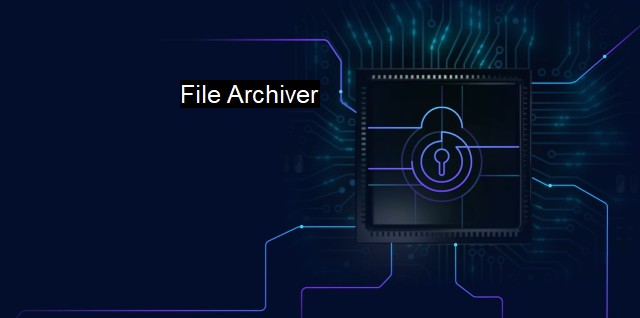What is File Archiver?
The Essential Tool for Efficient & Secure File Management: Understanding the Importance of File Archivers in Cybersecurity
A File Archiver is a critical tool used in managing computer files. It is a type of software that allows users to gather multiple data files and compress them into a single file known as an archive. This process aids not only in backing up and managing numerous records but also in transferring them across various devices and network environments more conveniently. Think about it: if you need to upload, download, or send numerous files over the web, it will be a more streamlined process if you can do it as a single, shrink down file, rather than tackling each one individually.An essential aspect of cybersecurity is the ability to protect these archives. When archiving files, sensitive data may be compressed into a smaller, more manageable format, but without the right protection measures, these smaller files become easy targets for unauthorized access and cyber threats. Hence, file archivers often offer a range of security features to safeguard data, including password protection, encryption, and checksum integrity validation, presenting both a means to organize and protect digital information in a single tool.
Because of the popularity of archiving files in both personal and business computing, a multitude of different types of archiving software exists offering a diverse set of features. Most of these software support popular archive types like ZIP, RAR, TAR, 7Z, and many others. The use of these compression algorithms is what makes creating file archives possible, reducing file size and thereby making storage and transmission more efficient.
Files can regularly be scanned using an antivirus program to help prevent malware-infected files from making their way into an archive during this compression process. Malware often employs tactics like disguising itself within innocent-looking files or hiding within system features. An unsuspecting user archiving such a file may inadvertently create an infected archive, which when opened on another system, unleashes the malware within. Therefore, archiving can unknowingly become a propagation method for digital threats if proper measures are not taken.
Antivirus software plays an essential role in this instance, by scanning the files both before and after being compressed into archives. The antivirus software will analyze the files for any known threats and eliminate those threats as needed. antivirus software can also scan existing archives, so if an infected file was unknowingly archived, its threat can be neutralized before extraction, protecting the computer system from infection.
It's important to consider the fact that due to widespread encryption in file archives, some viruses can slip through undetected during this scanning process. Modern cyber threats often blend into the digital environment, skillfully infiltrating system defenses by being unnoticed by primary security measures.
In this regard, vigilance plays a significant role. Users should only open archives that come from trusted sources, and ideally, running a robust and up-to-date antivirus when handling archives gleaned from the internet is advisable. Adaptive antivirus solutions, which can recognize behavioral anomalies and sense threats even without definitive virus signatures, prove especially beneficial here.
To summarize, a file archiver is a valuable tool for both file management and cybersecurity purposes. It simplifies the process of dealing with a large volume of data, efficiently compressing multiple files into a single convenient entity, while carrying the potential to support password protection and encryption to secure these bundled information. Coupling this archiving process with effective antivirus protection offers a dual-layer safety environment, and when handled with caution, enables a safer digital work or personal space.

File Archiver FAQs
What is a file archiver?
A file archiver is a software tool used for compressing and packaging files or folders into a single file, often with a ".zip" or ".rar" extension. File archivers are commonly used in cybersecurity to reduce the size of files being transferred or stored, and to protect files from unauthorized access.How does a file archiver help in antivirus protection?
File archivers can help in antivirus protection by compressing files, which can make it harder for viruses and malware to infect them. Additionally, some file archiving tools may include encryption options, which can further protect files from unauthorized access or tampering.What are some popular file archiving tools for cybersecurity?
Some popular file archiving tools used in cybersecurity include WinZip, 7-Zip, WinRAR, and PeaZip. These tools offer various compression and encryption options, and can be used to package and protect files or folders for secure transfer or storage.Is it safe to use a file archiver to compress and send files online?
While file archivers can provide some level of protection for files, it's important to remember that they are not foolproof. It's possible for compressed files to still be infected with viruses or malware. Therefore, it's still important to use other cybersecurity measures, such as antivirus software and secure file transfer methods, when sending files online.| | A | | | B | | | C | | | D | | | E | | | F | | | G | | | H | | | I | | | J | | | K | | | L | | | M | |
| | N | | | O | | | P | | | Q | | | R | | | S | | | T | | | U | | | V | | | W | | | X | | | Y | | | Z | |
| | 1 | | | 2 | | | 3 | | | 4 | | | 7 | | | 8 | | |||||||